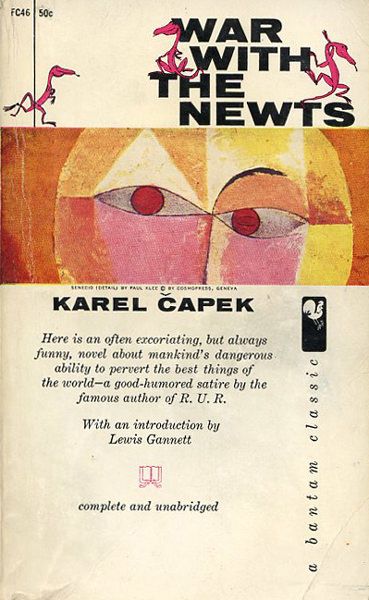An interbellum satire
War with the Newts
By Karel Čapek (Translated by Robert Weatherall & Mary Weatherall)

7 Jan, 2015
0 comments
Karel Čapek’s 1936 satire War with the Newts was published towards the end of Czechoslovakia’s inter-war golden age, a time when the writing was already on the wall for unfortunate Czechoslovakia. One can sense from the novel’s wry, often bitter, humour that Čapek had pretty clear views about what people were really like and those views were not positive ones. Čapek is often funny but it’s a dark funny.
The novel’s opens in a world dominated by Europeans — well, Westerners. Even a second- or third-rate white-skinned thug, like Captain van Toch, expects that every brown- or black-skinned person he encounters will do as he demands, or suffer violent reprisals. When van Toch stumbles over a small, isolated population of Andrias Scheuchzeri, human-sized intelligent newts, he sees them as just another resource to be exploited.
The Newts have the bad luck to live in a single lagoon in a particularly shark-rich region near Sumatra. The sharks keep the Newt numbers down and they also prevent the Newts from escaping the lagoon. The Newts’ aquatic lifestyle has greatly limited their technological development (although they are adept at building structures underwater). Happily for the Newts and a lot less happily for humanity, von Toch is there to offer the Newts trade items they could never make on their own.
Although von Toch’s scheme is to establish colonies of Newts around the Pacific as his own personal slave force, it doesn’t take long for his secret to get out. Commercial rivals spring up, eager to exploit the great potential of a Newt workforce able to work the continental shelves as easily as humans work the land. Soon, every nation is racing to capture and enslave their own population of Newts. While there are people who object to this on moral and political [1] grounds, those objections carry very little weight compared to short-term self-interest. Newts are just too useful not to be brutally exploited.
The catch, and it’s one that some people spot early on, is that the Newts have a phenomenal birthrate. The sharks and the limits of their original lagoon kept their numbers limited, but once they are out of the lagoon, Newt numbers skyrocket. Because each new Newt has a certain value and because the way that the humans exploit Newts does tend to use them up at a fearful rate, the fact that the Newt birthrate is even higher than the horrific death rate is merely considered useful. Human confidence that Newts are inherently inferior convinces the Newts’ owners that there is no serious danger from the Newts. No sea-bordering nation — which is most of them — wants to come in second in the race to exploit the Newts, so seemingly far-fetched worries are ignored.
Eventually there are far more Newts than there are people. Eventually there areas many Newts as the seas can sustain. Eventually, the only way for the Newts to expand their numbers is to expand the shallow seas. Happily for the Newts, not only are they adept at shaping their environment, but the humans have given them tools for the task, tools Newts could never have developed on their own.
Of course, expanding the oceans will be a little hard on the humans but eggs and omelets.…
This was published shortly before the Germans dismembered Czechoslovakia, as France and Britain stood by. While I imagine that this came as a bitter disappointment to the author, I doubt that the betrayal came as much of a surprise. Čapek died on Christmas Day of 1938, so he didn’t get to see the full extent of the human depravity displayed during World War II. I suspect that, as above, while he might have been disappointed, he would not have been surprised.
One of the recurring themes in Čapek’s books is misplaced confidence. The final crisis between Newt and human was predictable as soon as the Newt birthrate was known, but enough people are confident that human domination of the world is eternal that the naysayers are shouted down.
Another recurring theme is that short-term profit always trumps long term worries. Sure, the Newts might outnumber humans twenty-to-one in thirty or forty years but thirty or forty years is a very long time and there’s money to be made now. Plus, if the Dutch hold back from establishing vast colonies on Europe’s continental shelves, they can be sure the French and Germans will not be similarly inhibited.
The particular edition I have is the 1963 Bantam mass market paperback, which comes with an introduction by Lewis Gannett. Gannett’s essay is an odd little piece that builds up Čapek by painting Czechoslovakia as a particularly obscure nation whose culture is all but unknown to the West. Čapek was such a genius, according to Gannet, that he won acclaim despite his homeland’s obscurity. I kept expecting the phrase “a far away country […] people of whom we know nothing” to turn up but it never did.
Apparently the Robert and Marie Weatherall translation is “competent but uninspired.” The one you should all be looking for is Ewald Oser’s 1985 translation. The translation I read may be lacking, but the novel itself is enthralling, like watching the slow build-up toward catastrophe as one snowflake after another falls on an overburdened slope.
1: African-Americans are prominent among the groups opposed to enslaving the Newts. Every time they speak up, white mobs lynch them in great numbers. In fact, white Americans hardly ever make an appearance in the novel save when they are massacring African-Americans. Čapek seems to have seen lynching as the definitive white American characteristic and who can blame him?
